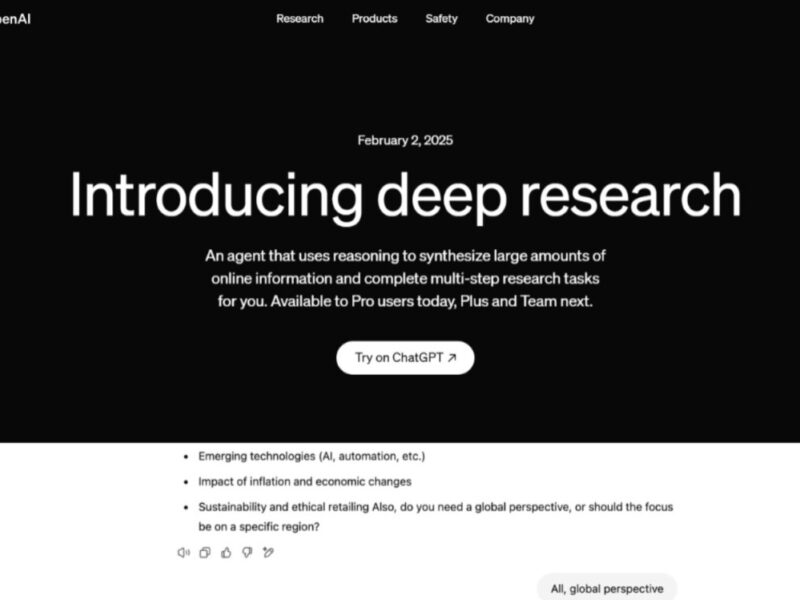ChatGPT Deep Research

What is ChatGPT Deep Research?
OpenAI’s ChatGPT Deep Research is a function, released on 02 Feb, 2025, Where you can perform Complex & In-depth research in science, engineering, policy & finance.
You can Submit questions and attach files or spreadsheets & ChatGPT will compile, evaluate & combine data from many sources.
ChatGPT Deep Research Key Features.
Here is the Mind-blowing🫡 Key Features of ChatGPT Deep Research:
- Comprehensive Research Skills: It Performs in-depth research on complex subjects like science, engineering, finance & policy.
- Autonomous Information Collection: It Compiles, Evaluates & Combines data from various sources to offer thorough insights.
- File and Spreadsheet Integration: More complex and data-rich research jobs are made possible by users’ ability to attach files or spreadsheets to searches.
- Detailed Reports: Depending on the complexity of the query, this feature may take 5 to 30 minutes to generate.
- Accuracy and Reliability: To ensure accurate and trustworthy information, a customized version of OpenAI’s o3 reasoning model that is tailored for online browsing and data processing is used.
- Citation and Source Tracking: It Enables you to confirm the information supplied by providing integrated citation and source tracking.
- Future Advancements: It includes Embedded images, data visualizations & connections to specialized data sources for enhanced research capabilities.
ChatGPT Deep Research Use Cases.
Here is the Various Use-Cases💻 of ChatGPT Deep Research:
- Academic Research Overview: It Conducts thorough literature reviews and data analysis & Generates detailed reports for research papers and theses.
- Financial Analysis: It Performs in-depth market research and trend analysis & Generates comprehensive financial reports and investment insights.
- Policy and Legal Research: It Researches and analyzes legal cases, statutes & regulations & Generates detailed reports on policy impacts and legislative changes.
- Scientific Research: It Conducts literature reviews and meta-analyses in various scientific fields & Generates detailed research reports and publications.
- Business Intelligence: It Performs market research and competitive analysis & Generates detailed business reports and strategic recommendations.
- Product Development and Marketing: It Conducts market research to understand customer needs & Generates detailed product analysis and development reports.
- Educational Content Creation: It Generates detailed study materials and lesson plans & Provides in-depth answers to complex educational queries.
- Healthcare Research: It Conducting literature reviews on medical conditions and treatments, Generating detailed reports on clinical trial results & Analyzing healthcare data for trend identification and improved patient outcomes.
ChatGPT Deep Research Pros/Cons.
Here is the Pros😃 & Cons😟 of ChatGPT Deep Research to knowing better about this AI:
Pros😃
- Provides in-depth, reliable information by autonomously gathering and analyzing data.
- It Saves time by Reduces complex research tasks to minutes.
- Allows users to input queries and attach files.
- It is Useful across various fields.
- It has Built-in Citation and Source Tracking that Verifies the information is reliable.
- It Utilizes specialized OpenAI Models for web browsing and data analysis.
Cons😟
- Requires a subscription, potentially expensive for limited or occasional use.
- Detailed reports can take 5-30 minutes, which may be too late compared to other models.
- Relies on web-based sources, potentially insufficient for specialized databases or offline materials.
ChatGPT Deep Research Pricing Guide.
ChatGPT Deep Research comes with the Pro Plan Subscription, Starts at $200/month, includes up to 100 queries, per month.
🫷NOTE👉: For the Most Accurate & Up-to-date Pricing information, Visit the Official Website as the information provided here might not be current.
ChatGPT Deep Research Integration Options.
Here is the Integration🔗Options provided by ChatGPT Deep Research:
- API Integration: The ChatGPT Deep Research API can be used by developers to include its features into their own programs, websites, or services. This makes it possible for smooth integration and customization according to particular requirements.
- Web Interface: Deep Research is currently only accessible online. If users choose the “Deep Research” option in the composer, they can access it directly through the ChatGPT interface.
ChatGPT Deep Research Demo Video.
This Demo Video will help you to understand🫡easily about this AI, Watch this Video Carefully!
ChatGPT Deep Research Safety & Privacy Measures.
Safety🧷& Privacy🔏 Measures are very essential to know that the user data is protected & safe, Here is the Safety & Privacy Measures provided by ChatGPT Deep Research:
- Content Moderation: It Prevents harmful information by actively filtering and regulating content.
- Ethical AI Guidelines: It follows ethical AI guidelines for fairness and transparency.
- User Feedback Mechanisms: Provides avenues for you to report issues and suggest improvements.
- Model Fine-Tuning: Regular updates and fine-tuning to address biases and ethical concerns.
- Safety Evaluations: Thorough evaluations conducted before expanding access to new user tiers.
- Data Encryption: Protects against unauthorized access.
- Data Minimization: Collects only necessary data.
- User Anonymity: Protects individual privacy.
- Strict Access Controls: Ensures only authorized personnel can access user data.
- Privacy Policy: Complies with privacy regulations and provides clear privacy policy. Read Privacy Policy
How We Rated it? Our Rating Score – 4.9/5⭐
Here is the Comprehensive Overview on How We Rated⭐ It:
- Features and Functionality: 4.9/5⭐
- Ease of Use: 5/5⭐
- Performance: 4.8/5⭐
- Scalability: 4.8/5⭐
- Customer Support: 4.8/5⭐
- Pricing and Value: 4.6/5⭐
- Innovation: 4.8/5⭐
- User Reviews and Feedback: 4.7/5⭐
- Safety and Privacy: 4.9/5⭐
How ChatGPT Deep Research Stands Out From The Rest?
ChatGPT Deep Research is an advanced AI Feature that offers a sophisticated online research approach.
It uses the latest o3 reasoning model for complex web browsing and data analysis, generates detailed reports with clear citations and summaries, and provides a notification system for completion. It can handle large amounts of data like text, images, and PDFs.
